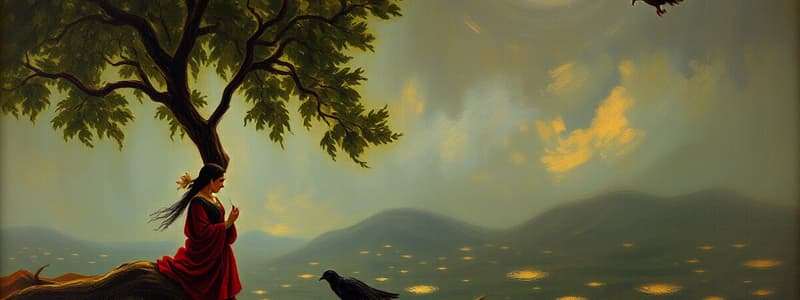Podcast
Questions and Answers
What is the primary form of Indian literature as identified in the content?
What is the primary form of Indian literature as identified in the content?
- Narrative poetry
- Philosophical texts
- Vedic literature (correct)
- Historical epics
Which of the following are included in the components necessary for understanding the Vedas?
Which of the following are included in the components necessary for understanding the Vedas?
- Sutra texts and shlokas
- Siksha and Bhagavad Gita
- Kalpa and Chhanda (correct)
- Upanishads and Mahabharata
What is the extent of the Mahabharata in terms of shlokas?
What is the extent of the Mahabharata in terms of shlokas?
- 100,000 shlokas (correct)
- 50,000 shlokas
- 200,000 shlokas
- 500,000 shlokas
Which philosophical school does not accept Vedic authority?
Which philosophical school does not accept Vedic authority?
What type of poetry includes Sandesh Kavyas?
What type of poetry includes Sandesh Kavyas?
Which of the following describes the Vedic limb known as Nyaya?
Which of the following describes the Vedic limb known as Nyaya?
Which of the following is NOT a type of Kavyas mentioned in the content?
Which of the following is NOT a type of Kavyas mentioned in the content?
Which of the following best describes 'Shad Darshana'?
Which of the following best describes 'Shad Darshana'?
Flashcards are hidden until you start studying
Study Notes
Indian Literature Overview
- Indian literature encompasses the verbal form of knowledge, primarily derived from the Vedas.
- The Vedas are classified into four main texts and serve as foundational scriptures in Indian culture.
Vedic Literature
- Vedic literature is further divided into various branches, including:
- Samhitas: Collections of hymns and mantras.
- Aranyakas: Texts associated with forest-dwelling hermits.
- Brahmanas: Prose texts explaining rituals and ceremonies.
- Upanishads: Philosophical texts exploring the nature of reality and existence.
- Kalpa Sutras: Guidelines for rituals and ceremonies.
- Shrauta Sutras: Classic texts on ritual practice.
- Dharma Sutras: Texts on social duties and ethics.
- Grihya Sutras: Domestic rites and rituals.
Components of Vedas
- Each Veda includes a 'Shiksha' text dedicated to the study of sound and word.
- Understanding the Vedas necessitates studying their components, known as:
- Shiksha: Phonetics and pronunciation.
- Kalpa: Ritual procedures.
- Vyakarana: Grammar.
- Nirukta: Etymology and interpretation.
- Chhanda: Metrics and prosody.
- Jyotisha: Astronomy and astrology.
Arsha Kavya and Historical Texts
- Arsha Kavya represents the historical dimension of Indian literature, showcasing extensive vocabulary.
- Mahabharata: Enormous epic with over 100,000 shlokas.
- Shrimad Valmiki Ramayana: Composed of 24,000 shlokas.
- Both texts inspired various poetic forms, including:
- Mahakavyas (epic poems)
- Khandakavyas (narrative poems)
- Sandesh Kavyas (message poems)
- Ragu Kavyas (lyrical poems)
- Stotra Kavyas (hymnal poems)
Philosophy in Indian Literature
- Indian philosophy offers insights, arguments, and logic to understand and critique Vedic principles.
- Shad Darshana (Six Schools of Philosophy) view Vedas as authoritative:
- Sankhya
- Yoga
- Vaisheshika
- Nyaya
- Purva Mimamsa
- Uttara Mimamsa
- Non-Vedic philosophies include Charvaka and Buddha Darshanas.
Nyaya and Mimamsa Schools
- Mimamsa Shastra aids in interpreting Vedic sentences and their implications.
- Nyaya Shastra focuses on logic, arguments, and establishing truth against opposing views.
Vedanta Philosophy
- Vedanta discusses key concepts such as soul, world, God, maya (illusion), and atma (self).
- Different acharyas elaborate on Vedantic principles through various theories:
- Advaita: Non-dualism
- Dvaita: Dualism
- Vishishtadvaita: Qualified non-dualism
- Dvaitadvaita: Dualistic non-dualism
- Shuddhadvaita: Pure non-dualism
Conclusion
- Indian literature and philosophy are rich and diverse, deeply rooted in Vedic traditions and encompassing a range of poetic and philosophical expressions.
Studying That Suits You
Use AI to generate personalized quizzes and flashcards to suit your learning preferences.




